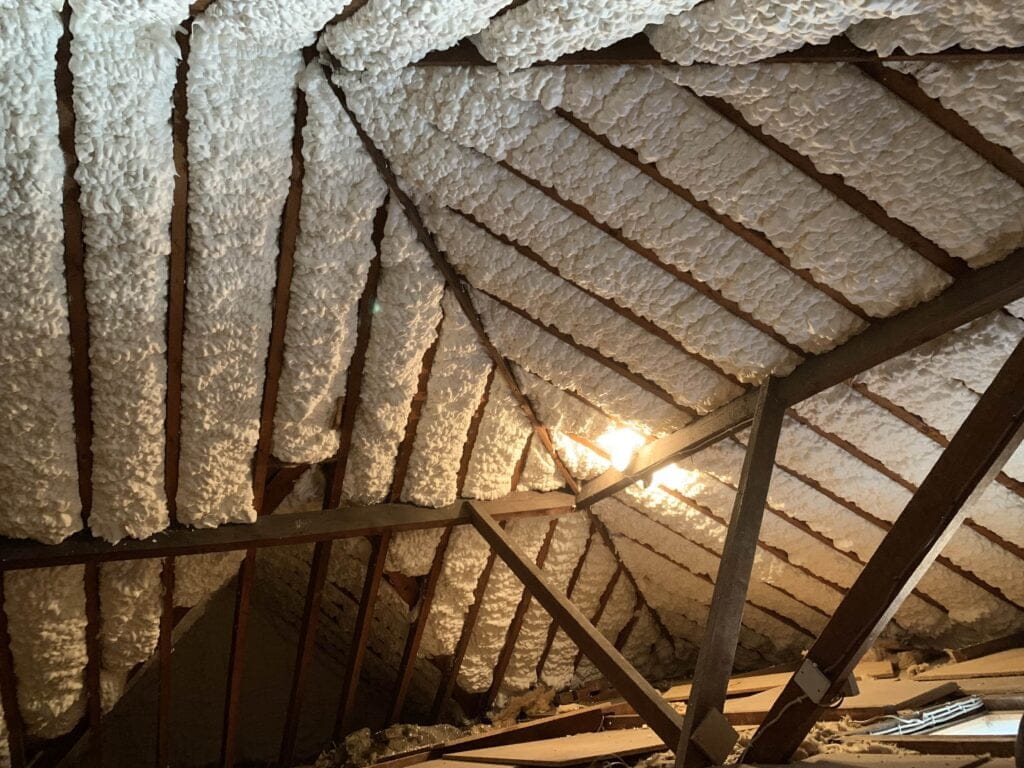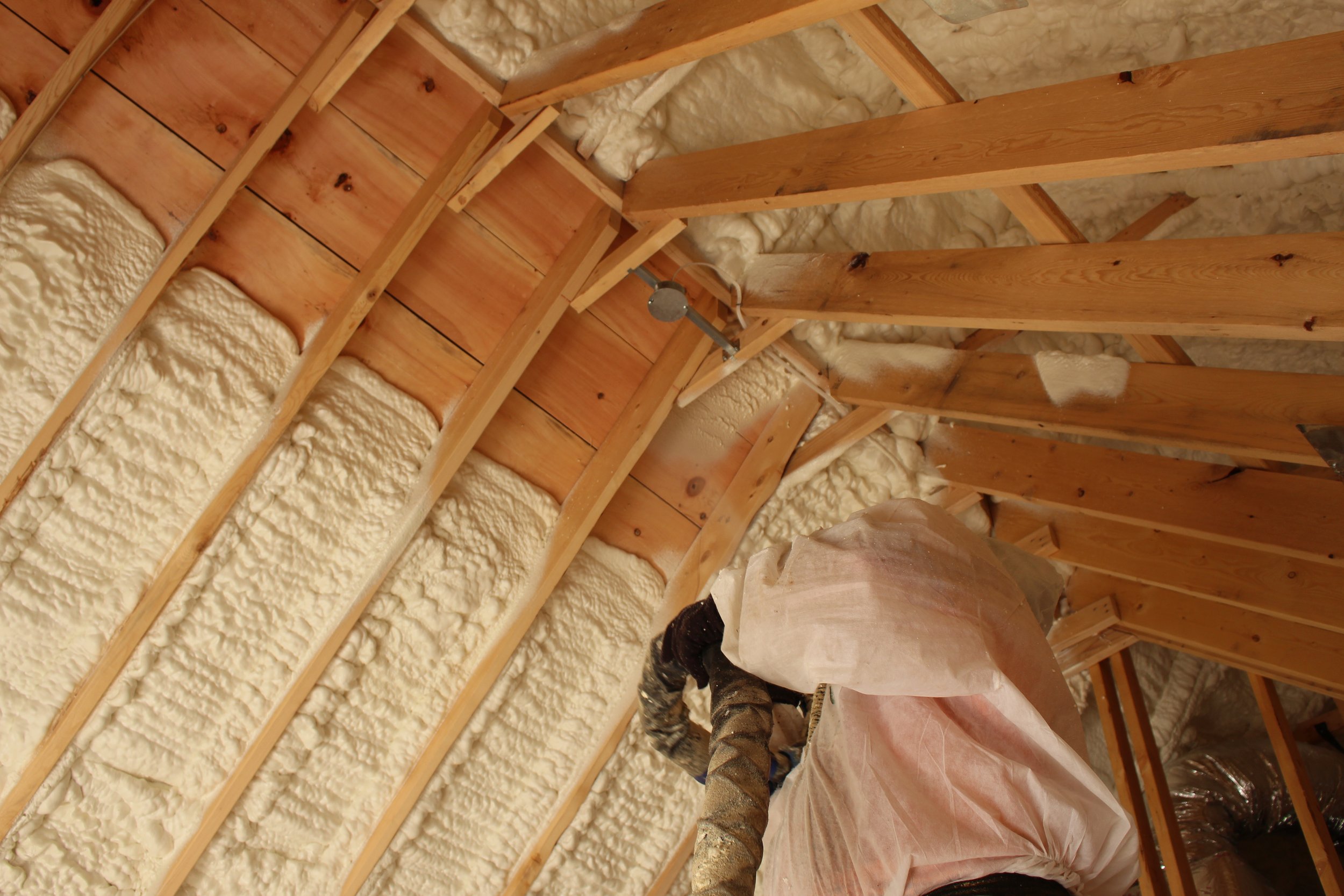Recognizing the Benefits of Using Spray Foam for Insulation Projects
Recognizing the Benefits of Using Spray Foam for Insulation Projects
Blog Article
Spray Foam: The Ultimate Remedy for Air Sealing and Insulation
Spray foam insulation has arised as a leading service for reliable air securing and thermal insulation, using an one-of-a-kind mix of residential properties that establish it apart from typical approaches. Comprehending the full scope of its benefits, installation procedures, and contrasts with other insulation types is crucial for making informed choices.
What Is Spray Foam?
Spray foam is a flexible insulation product that incorporates the concepts of air securing and thermal resistance to improve power performance in structures. Made up largely of polyurethane or other similar substances, spray foam is applied as a liquid that increases upon call with surfaces, producing a solid, continual layer of insulation. This special residential property permits it to fill up spaces, cracks, and voids that traditional insulation products might overlook, giving a superior air seal.
There are two primary sorts of spray foam: open-cell and closed-cell. Open-cell spray foam is lighter and a lot more flexible, using outstanding audio absorption and a reduced R-value per inch - Spray Foam. In contrast, closed-cell spray foam is denser, providing a higher R-value, dampness resistance, and added architectural integrity to constructing elements
The application procedure commonly includes customized devices, making certain a seamless application that sticks to different substrates, consisting of concrete, steel, and wood. This flexibility makes spray foam suitable for both brand-new constructions and retrofitting existing frameworks. Its ability to produce an airtight barrier dramatically adds to decreasing power usage and improving interior air quality, consequently making it a favored selection amongst house owners and building contractors alike.
Benefits of Spray Foam Insulation
Among one of the most significant benefits of spray foam insulation is its phenomenal ability to produce a continual air barrier, which efficiently decreases power loss. Unlike conventional insulation materials, spray foam expands to load fractures and spaces, making sure that air leak is considerably minimized. This particular not just boosts power effectiveness however additionally brings about lower utility bills in time.
Additionally, spray foam insulation offers exceptional thermal resistance, contributing to a more stable indoor environment. Its high R-value per inch permits reliable insulation in confined rooms, making it excellent for attics, walls, and crawl areas. The moisture-resistant homes of spray foam help prevent mold and mildew and mold growth, promoting much healthier living conditions.
Another crucial benefit of spray foam insulation is its sound-dampening qualities (Spray Foam). It effectively decreases sound transmission between areas, producing a quieter and more comfy home atmosphere. The durability of spray foam additionally sticks out, as it does not droop or work out in time, keeping its efficiency throughout its life expectancy
How Spray Foam Works
Recognizing just how spray foam insulation works is essential for valuing its efficiency in air securing and thermal resistance. Spray foam insulation includes two key parts: isocyanate and polyol resin. When these components are blended, they undertake a chemical response that triggers the product to expand quickly, producing a thick foam that fills cavities, gaps, and check my reference fractures.
As the foam expands, it abides by surfaces, developing an airtight seal that considerably minimizes air Continued infiltration. This particular makes spray foam insulation extremely efficient at preventing drafts and wetness penetration, which can bring about energy loss and damages with time. In addition, the closed-cell version of spray foam uses remarkable thermal resistance as a result of its stiff structure, effectively decreasing heat transfer.
The one-of-a-kind homes of spray foam allow it to adapt irregular surfaces, guaranteeing detailed coverage and a smooth barrier. As a result, spray foam insulation not only improves power performance but additionally adds to boosted indoor air top quality by reducing the accumulation of pollutants and allergens. Inevitably, understanding the technicians behind spray foam highlights its duty as a superior option for insulation and air securing in both household and business applications.
Installation Process Review

Before installment, the room has to be effectively cleaned up and prepped, guaranteeing that surface areas are devoid of dirt, moisture, and debris. This action is essential due to the fact that impurities can jeopardize attachment and general performance. Once the area is prepared, the application entails blending both components of the spray foam, which increases upon call and fills up gaps properly.
Educated specialists ought to perform the setup, utilizing customized tools to make sure uniform coverage and optimal density. Safety and security preventative measures, consisting of using protective equipment and making certain appropriate air flow, are necessary during this procedure. After application, the foam generally treatments quickly, forming a solid barrier that boosts power effectiveness.
Contrasting Spray Foam to Standard Insulation
When evaluating insulation alternatives, spray foam insulation stands out in contrast to typical materials such as fiberglass and cellulose. Unlike fiberglass and cellulose, which can permit air infiltration, spray foam increases upon application, loading gaps and voids to create an impermeable seal.
Furthermore, spray foam gives a higher R-value per inch than standard insulation types, offering more reliable thermal resistance in a thinner account. This characteristic is specifically valuable in spaces with minimal dental caries deepness. In addition, spray foam is immune to wetness and mold development, which can be a considerable interest in cellulose and fiberglass, specifically in damp settings.
However, spray foam insulation typically lugs a greater upfront price than its typical equivalents. Property owners need to weigh this initial financial investment against long-lasting power cost savings and performance benefits. Ultimately, while both insulation kinds serve their function, spray foam emerges as an advanced solution for modern insulation requirements, especially in terms of air sealing and thermal performance.

Verdict
In recap, spray foam insulation stands for an extremely efficient solution for accomplishing ideal air securing and thermal resistance. Its special homes, consisting of dampness resistance and audio dampening, make it suitable for numerous applications in both new buildings and retrofitting projects (Spray Foam). Although the first prices may be greater compared to conventional insulation materials, the long-term advantages, such as substantial energy cost savings and enhanced interior air high quality, have a peek at these guys warrant the investment and underscore its worth in modern building practices.
Spray foam insulation has emerged as a leading service for reliable air securing and thermal insulation, providing an one-of-a-kind mix of residential properties that set it apart from typical approaches.Spray foam is a flexible insulation material that combines the concepts of air sealing and thermal resistance to improve power effectiveness in structures.When assessing insulation choices, spray foam insulation stands out in comparison to typical products such as fiberglass and cellulose. Ultimately, while both insulation types offer their purpose, spray foam arises as an extra innovative remedy for contemporary insulation requirements, especially in terms of air sealing and thermal effectiveness.
In recap, spray foam insulation stands for a very reliable remedy for attaining optimal air sealing and thermal resistance.
Report this page